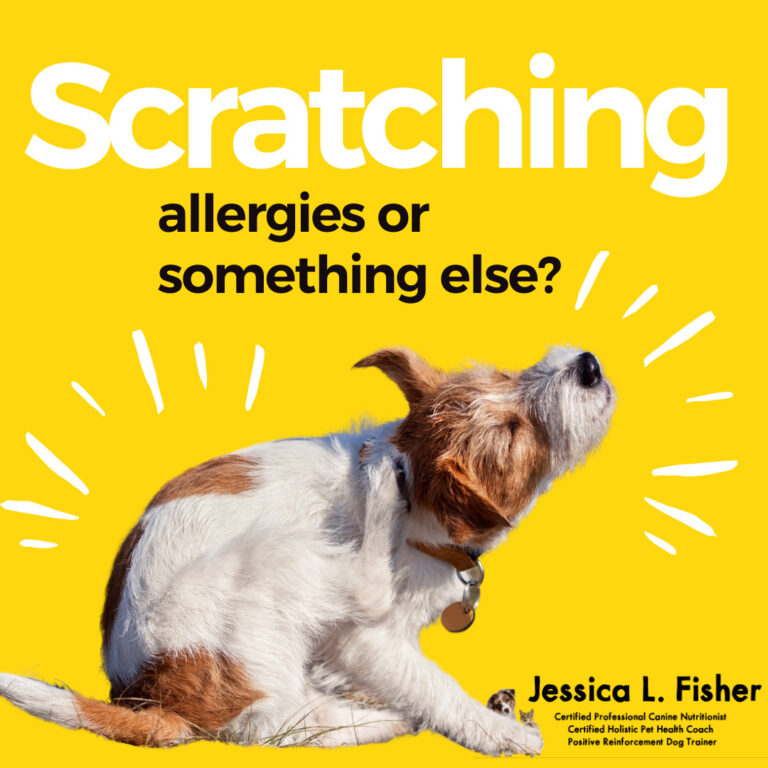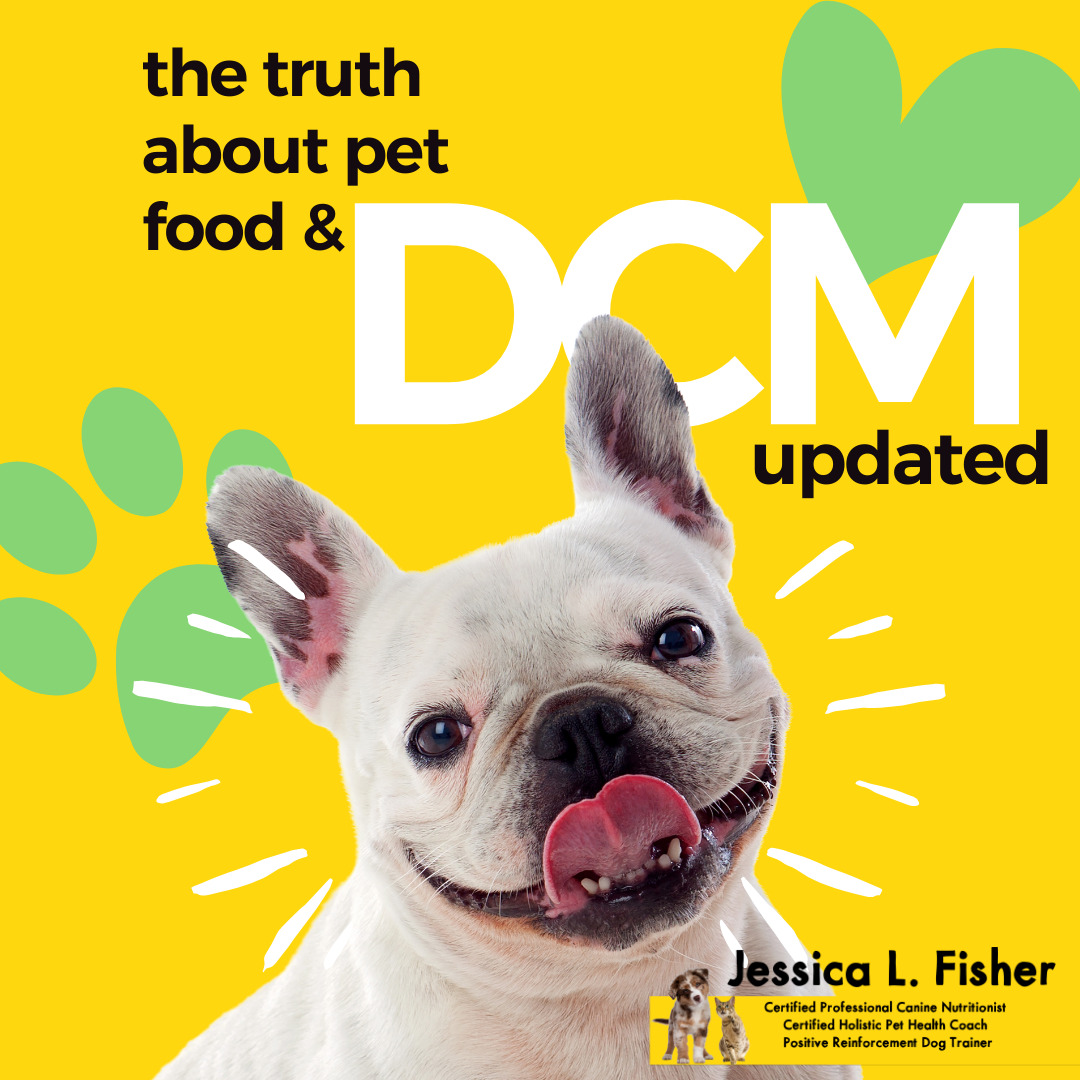For many dogs, scratching happens often and often isn’t normal. I think it’s becoming normalized because it is just so prevalent and maybe we even become blind to it sometimes, but if your dog is scratching regularly, then there are definitely some things to look into to help your dog and their scratching problem.
Scratching is most commonly associated with fleas, and while that is on the list, it’s certainly not the only thing on the list and also not even at the top of the list. So, what are some things to consider if I notice my dog scratching all the time?
1. Allergies
Just saying allergies aren’t terribly specific. Are they having seasonal allergies? Are they allergic to something new inside the home, maybe an air freshener or candle? Or maybe they have a food allergy or even an allergy to flea bites. Dogs can have allergies – or sensitivities – to any and everything, just like we can. So if your vet tells you that they could have an allergy, don’t just look at grass or dust as the culprit.
For seasonal allergies, we can limit exposure to the outside, wipe their paws when they come inside and even run an air purifier in the home to help your pet. Quercetin and nettles are also great for helping the body handle seasonal allergies. I love Green Juju’s freeze-dried Just Greens blend for the added nettles!
This is a good time for me to interject feeding a fresh food diet because our dogs develop sensitivities to highly processed foods quickly due to the poor quality of ingredients and highly inflammatory nature.
It’s always a good idea to leave out artificial fragrances as well. Whether a can of air freshener, a plug-in, or a scented candle, they often contain “natural fragrances” which is a catch-all term for many things, including phthalates, which many are known carcinogens.
The bottom line, allergies aren’t quite so simple, and much more investigating needs to be done. One word of advice, if you take nothing else away from this – don’t just treat the symptoms, go after the cause of the symptoms.
Additional information on this topic:
Warning: 3 Things To Know Before Feeding Commercial Pet Food
Healthy Pet Food Awareness Week
Pro Tip: For food sensitivities, work with a canine nutritionist and/or holistic pet health coach to create a rotation and elimination diet to help the gut return to normal function so that food sensitivities can become a thing of the past!
2. Boredom or Anxiety
Yes, a boring pet or a pet with anxiety can certainly resort to excessive scratching, licking, and chewing. When your dog has nothing to do, they can look for anything to pass the time.
Anxiety can also lead to scratching, licking, and chewing because they need an outlet for their emotions.
Boredom is relatively easy to fix. We need to engage your dog with mental and physical enrichment and exercise every single day. What and how much can vary for every dog, so you will want to tailor activities to suit your pup.
Bored Dog? Here are 5 Ways To Engage Their Brain
How To Tell If My Dog Is Depressed?
How To Make Dog Meals More Fun
3. Dry Skin
Yes, just like us, our dogs can get dry skin, especially in dryer climates and in winter months when we are indoors with artificial heat running. Keeping our dogs hydrated is important, and most dogs will drink enough water, but I’ve just found another opportunity to promote fresh feeding!
I feed my dog a raw food diet that is very moisture-rich, so even if she doesn’t supplement with drinks from her water bowl, I know that she is receiving adequate moisture through her diet.
Sometimes we still need help with dry skin and my number one recommendation is to add a balance of omega-3s and omega-6s. Omega 3 and Omega 6 work together and an imbalance could cause havoc, so not just any supplement will do. While whole fish would be the best, we also have to consider the availability and that larger fish have the potential for high levels of heavy metals, the best available sources are Atlantic mackerel, sardines, and anchovies.
Additionally, I love the numerous benefits of coconut oil, both ingested and topically. CocoTherapy is my go-to for high-quality coconut oil.
CBD Dog Health makes salves that are also beneficial for dry and irritated skin. Check out Soothe!
4. Hormonal Imbalances
There are many hormonal imbalances associated with excessive scratching, one of which is hypothyroidism. For this topic, I sought out Dr. Becker’s blog for more information.
“This is a condition in which a dog’s thyroid is underactive and unable to produce enough of the hormone thyroxine to meet the body’s needs. Hypothyroidism is more common in medium to large dogs of both sexes who are between the ages of 4 and 10. Several breeds are genetically predisposed to the disorder”
Most pets in the United States are spayed or neutered, which means that they are missing some very crucial organs that are responsible for hormone production. Over time, the hormone cycle becomes dysfunctional while some hormones are no longer present, causing others to over produce.
Another great reason to always check with your veterinarian when your pet has changes in mood or behavior.
In Traditional Chinese Veterinary Medicine, like treats like, so feeding reproductive organs (male to males, female to females) can be beneficial, as well as targeted herbal therapy.
5. Pain
While I just mentioned that a hormone imbalance is a great reason to consult your vet for excessive scratching, pain is another excellent example of why we always need to consult with our veterinarians.
If your dog has pain, possibly a cut or abrasion, or even something internal that we may not be able to identify, scratching, pawing, and licking an area is a normal response for a dog. So it may not be itching, it could actually be pain. This would also include ear infections as well as sores and infections in the mouth.
While not a replacement for a thorough veterinary exam, once you know what could be causing pain to your dog (an address it as best as possible) an organically grown full-spectrum hemp oil can be very beneficial for many ailments that can cause pain. Check out CBD Dog Health’s EASE for arthritis!
6. Parasites
Ok, I finally got here. I know, it’s often one of the first things we think about when we think of a dog scratching, and while it is on the list, it isn’t the only thing.
Fleas, mites, and ticks are some of the most common external parasites known to cause scratching in our dogs. Your dog could also be scratching or rubbing their bottom if they have worms or internal parasites.
While there are many chemical preventatives on the market, I would like to offer you some food for thought on why alternative therapy is probably best for your pet.
STOP! Using Flea & Tick Meds On Your Pet … Here’s Why
SAFEST Flea & Tick Treatments for Dogs & Cats
7. Phantom Scratching
This one is interesting and certainly would not be at the top of the list if you go in to see your vet, but basically, there are instances where the nervous system could be firing, telling your dog that there is an itch when there is no physical stimulus that would normally cause this to happen.
Remember that while this phenomenon is real, it is also rare. I would also say that if you and your vet are going through all possibilities of itching and scratching for your dog, do not skip over possible food intolerances and vaccinosis. Two things that most traditional medicine (allopathic) veterinarians do not have much training or experience with is nutrition and vaccinosis, so if they recommend switching to another kibble, it would be in your dogs best interest to seek the help of a canine nutritionist, or at least someone who can help you do a proper elimination diet, as well as a holistic or homeopathic veterinarian for possible vaccinosis symptoms.
Only once all other possibilities have been exhausted will your vet likely refer you to a specialist who could help with identifying Syringomyelia (the proper term for phantom scratching).
🌟 BONUS 🌟
8. Vaccinosis
Over-vaccinating, whether in dose or frequency, can lead to a host of mental and physical issues that fall under the umbrella term vaccinosis.
Is Your Dog Really Due For A Vaccine? What Is Titer Testing?
What is vaccinosis? According to Dr. Karen Becker:
“It isn’t an acute, often immediate adverse reaction to a vaccine like those described above. Adverse events, or hypersensitivities, whether mild (such as lethargy, flu-like symptoms, etc.), or severe (such as anaphylactic shock), that are clearly linked to a recent vaccination are widely acknowledged by the conventional veterinary community. They’re viewed as occasional aberrations of a basically safe procedure.
Vaccinosis, on the other hand, is a problem only holistic and integrative veterinarians seem willing to acknowledge. It is a reaction of a pet’s body to vaccines that have been injected without the pet having experienced a notable adverse event or hypersensitivity. These are chronic reactions to not only the altered virus contained in the vaccine, but also to the chemicals, adjuvants, and other components of tissue culture cell lines — as well as possible genetic changes — that can be induced by vaccines.”
Symptoms of vaccinosis:
– lethargy
– hair loss
– hair color change at the injection site
– fever
– soreness
– stiffness
– lack of appetite
– conjunctivitis
– sneezing
– oral ulcers
– immunosuppression
– behavioral changes
– vitiligo
– weight loss
– reduced milk production (females)
– lameness
– granulomas and abscesses
– hives
– facial swelling
– allergic hypersensitivity
– respiratory disease
– allergic uveitis
– injection site sarcoma (cancer)
– anaphylaxis
– autoimmune arthritis
– polyarthritis
– hypertrophic osteodystrophy
– autoimmune hemolytic anemia
– immune-mediated thrombocytopenia
– thyroiditis
– glomerulonephritis
– myocarditis
– encephalitis or polyneuritis
– seizures
– abortion
– congenital abnormalities
– embryotic death
– infertility
And remember, a vaccine can only be given to a healthy pet. So if your pet has a cold, upset tummy, allergies, ANYTHING that is other than completely healthy, they are not candidates for a vaccine in the first place.
This last excerpt is from a cat blog I did during Happy Cat Month (part 3 specifically). I only mention this to say that while I may sway content to either cats or dogs (mostly for the purposes of people searching for information) it is important to read through everything because you never know when you’ll find that nugget of information that sparks an idea in your brain that leads you to the answer you – or your pet – needs!
Here is a link to a previous post about paw licking.
I hope this can help someone out there who is having trouble identifying the source of the itch for their pup. Feeling helpless isn’t a place I like to be, so always keep learning!




